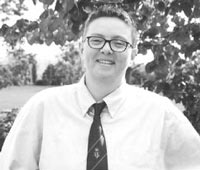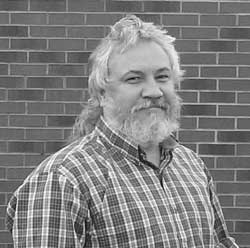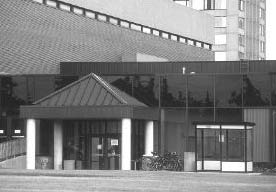
|

|
| | |
| | VOLUME 30, NUMBER 6 | WEDNESDAY, OCTOBER, 1999 | ISSN 1199-5246 | | |
| | ||
|
|
By Nishat Karim York University's Osgoode Hall Law School revisited the late Chief Justice Brian Dickson's days of the high court on Wednesday Sept. 22, when the Honorable Mr. Justice Robert Sharpe of the Ontario Court of Appeal delivered the third Pierre Genest Memorial Lecture on "The Constitutional Legacy of Chief Justice Brian Dickson". Dickson presided over the nation's highest court from 1984-1990, a pivotal time in Canadian history when the Charter of Rights and Freedoms was transforming the court's role in shaping the laws of the land. Under his wing, the court broke new legal ground, writing a set of principles and guidelines that have shaped Canadian lives in areas such as Sunday shopping, aboriginal access to hunting and fishing grounds and access to abortion. Peter W. Hogg, dean of Osgoode Hall Law School and a trustee of the fund, was quoted by the Toronto Star on Oct. 18, 1998, saying "He (Dickson) was a renaissance man who could turn to any field of law and write about it in an exceptionally scholarly and intelligent fashion." Sharpe discussed the essential features of Dickson's constitutional legacy by dividing it among four basic principles of constitutional factors: federalism, constitutionalism, protection of minorities and democracy. He shared with the gathering, Dickson's most significant areas of work including the fundamental design of the charter especially pertaining to the issues of freedom of religion and anti-discrimination. Bringing a wealth of legal wisdom and experience to the subject, Sharpe is the author of books such as The Law of Habeas Corpus (2nd ed., 1989) and The Last Day, The Last Hour: The Currie Libel Trial (1988). He has appeared as counsel in courts of both civil and criminal proceedings and has served as both the dean of the Faculty of Law at the University of Toronto and an executive legal officer at the Supreme Court of Canada. In 1991, Sharpe was elected a Fellow of the Royal Society of Canada. Frequently he is a lecturer at academic conferences and professional development seminars. Pierre Genest, a graduate from Osgoode Hall Law School in 1954, became one of the finest counsels in Canada. After his death in 1989, the Pierre Genest Memorial Fund was created to honour his memory. The fund endows an annual lecture on the theme of understanding Canada's bilingual and bicultural character. Earlier Genest lectures have been delivered by the honourable Peter Lougheed, former Premier of Alberta, and by professor Patrick Monahan of Osgoode Hall Law School.
| |
|
|
By Nishat Karim Gábor Lukács, doctoral student in mathematics and statistics Its not often that you see a 16 year old PhD student working on mathematics and statistics for the pure enjoyment of it. Well, look out because you might just pass him in the hall at York this term. Gábor Lukács has begun his PhD studies at York University this year in mathematics and statistics. Fluent in both Hungarian and Hebrew, Lukács passion for numbers began at an early age. "My interest in mathematics grew out of arithmetic games that I played with my father starting when I was aged four," said Lukács. "When I was 11, I decided that I wanted to be a mathematician. Mathematics is unique among the sciences in that the mathematician's laboratory is within his mind all a mathematician needs is a pencil and a piece of paper. York's Department of Mathematics and Statistics' strength in algebra, my favourite interest, should provide me with an opportunity to learn new material and explore other branches in math," he said. But don't let his intelligence fool you. He still loves the simple things in life like swimming, cycling, ping pong and Bach. Yes, Bach. And Mozart, Beethoven, Vivaldi and other classical musicians. Lukács also enjoys reading in his spare time. Writers such as Homer, Shakespeare and Kafka are a few of his favourites. Born in Hungary, but living in Israel since he was eight, Lukács began his undergraduate studies after grade six, at the minor age of 12. In February 1998, he completed his BA after just two and a half years of study. Following this, Lukács began his masters degree in pure mathematics, which he recently completed in July 1999 at Technion Israel Institute of Technology. Lukács' long term goals include seeking a career in academia, during which time he hopes to give something back to mathematics through research and teaching.
| |
|
|
By Susan Scott Fifteen university students from across Canada participated in a six-month international internship program administered by York's Centre for Research on Latin America and the Caribbean (CERLAC). CERLAC partnered with the federal government's Department of Foreign Affairs and International Trade (DFAIT) to recruit and select interns for the Youth International Internship Program (YIIP) which ran from September 1998 to February of last year. The program gave the graduates international work experience and knowledge by placing 13 interns at the Organization of American States (OAS) in Washington, and two at the Inter-American Children's Institute in Montevideo, Uruguay. Founded in 1948 the OAS comprises North, South and Central America, and the Caribbean, and aims to strengthen democracy and human rights, expand trade and tackle issues such as poverty, corruption and drugs within its 35-member group. In addition to the internship, there was a two-week pre-internship workshop and a one-week post-internship debriefing session, both held at York. During their stay, 13 interns worked alongside, OAS staff, learning about the organization's work, and having the opportunity to conduct research on various topics. One of the interns was York International Studies graduate, Minerva Hernandez-Iraheta who immigrated to Canada with her family from El Salvador when she was 14. As she was completing her internship at the OAS, she was hired to work at DFAIT's Hemispheric Summit Office helping to organize the Conference of Spouses of Heads of State and Government of the Americas which Canada hosted this past September. When the internship program was announced in March 1998, then International Trade Minister, Sergio Marchi, said, "Canada views Latin America as a priority for further economic, political and social links. Through this project, we can offer young Canadians the opportunity to become familiar with issues of the Americas." Ricardo Grinspun, former CERLAC director, and director of the internship project, said "this initiative is particularly important as Canada prepares to host for the first time the General Assembly of the OAS in 2000." The YIIP is part of the federal government's youth employment strategy to help young people land their first job by offering the opportunity to get international work experience. To be eligible for the program, an applicant must be a Canadian citizen or permanent resident aged 30 or under. As well, this must be the recruit's first paid employment overseas. Although CERLAC is not currently offering a youth internship, anyone interested can check the DFAIT website at: http://www.dfait-maeci.gc.ca/ interns/ or the Canadian International Development Agency website at: http://acdi-cida.org/index.html.
| |
|
|
CALL FOR CONSULTATION AND NOMINATIONSA Search Committee advisory to the president has been established to make recommendations to the president concerning a new dean of FGS. Members of the Search Committee are:
George Fallis, Chair, dean, Faculty of Arts
The dean is the chief academic and administrative officer of the Faculty of Graduate Studies. The dean holds ultimate responsibility for all of the internal administrative affairs of the Faculty and should be seen as the leader of the Faculty in academic matters, both internally and externally. A more extensive description of the duties of the dean is available from the secretary. It is expected that the term of the dean will begin July 1, 2000. The Search Committee will consult broadly to develop selection criteria to guide it in its search and invites comment from across the University community regarding the criteria. The committee invites nominations from within the University. Search criteria, which will be developed through consultation, will form the basis for selection.
Please submit nominations in confidence to:
The committee welcomes applications from all qualified individuals and encourages applications from women, members of visible minorities, aboriginal persons and persons with disabilities.
| |
|
|

Prof. Jean Noble York University has four categories of annual University-Wide Teaching Awards that it presents for excellence in teaching. Over the next few weeks, this series will continue to showcase each of the 1999 recipients from the categories of senior full-time faculty, full-time faculty, contract/part-time faculty, as well as teaching assistants. Presented during convocation, these awards are sponsored by the York Parents' Association and the recipients are selected by the Senate Committee on Teaching and Learning. Jean Noble has earned the respect of her colleagues and students as an excellent teacher during her past six years with the Department of English, Faculty of Arts. It comes as no surprise that she was selected as co-recipient of the 1999 Parents' Association University-Wide Teaching Award for Teaching Assistants. Ranked in the top category in student course evaluations, she is consistently noted as "one of the best", "an exemplary teacher" and "exceptionally gifted". Her students recall her as being flexible and versatile, constantly fine tuning her teaching strategies to create a learning environment where they feel respected and valued. Noble is noted for her ability to organize and clarify complex textual materials and issues, making them interesting and accessible for students. Each year she develops extensive handouts and integrated essay writing workshops into her classes, leading many of her students to a dramatic improvement of their writing skills. It is no wonder that many students choose courses where Jean is a part of the teaching team.
| |
|
|
Philip Hoffman, film and video professor by Cathy Carlyle York's film and video professors and students can schmooze with the best of them. At the 24th annual Toronto International Film Festival this year, they were mingling with the film world's glittering gurus from Hollywood and beyond -; and exhibiting some of their own star quality at the same time. "It's a wonderful celebration of film and a huge festival, but it is becoming more of a 'star-gawking' event," said Philip Hoffman, a new professor in York's Department of Film and Video in Fine Arts. "The media tends to latch onto the American stars and that takes away from any focus on Canadian content. But as long as they keep screening shorts, documentaries and Canadian features, I still feel good about the festival." Hoffman was among several York faculty, alumni and students who had films showcased at the prestigious festival this year. Kokoro is for Heart, a seven-minute black and white performance piece filmed against the backdrop of a gravel pit, generated much discussion in the Perspective Canada program. Hoffman described the work as experimental, a "cine-poem" made quickly and with spontaneity, and featuring poet Gerry Shikatani. "Even though that blending of poetry and film has been around for awhile, it's definitely not mainstream yet. "This film looks at the way that voice can communicate beyond language, because sound is not always only language," said Hoffman. "It deals with three languages -; English, Japanese and French. Gerry's work examines voice as gesture rather than as language alone. The poet is trying to show that there's a universal language. It's a way of communicating feelings through sound. This way of working with the voice has been established in other cultures, for example the throat singing of the First Peoples." It was Hoffman's 10th screening in the Toronto Film Festival. His short, experimental films have won numerous awards, including three last year at festivals in the US for the documentary Destroying Angel. His work, Technilogic Ordering, received jury citations at the '94 Toronto film festival and the Ann Arbor Film Festival, and Chimera ('96) was given first prize at the Athens Film Festival. He has presented seminars and production workshops as well as screenings of his films on four continents. Other faculty and students from York were involved in this year's festival: Amnon Buchbinder, York professor of film and video, was a programmer of the festival workshop series The 1999 Ultra Indie Experience. Buchbinder's short films have been screened at festivals worldwide, including Cannes, Edinburgh, Rotterdam, Lille and Los Angeles, as well as in Toronto; at important venues in Europe; and on national broadcasts. His first feature film, The Fishing Trip, which he produced and directed, received rave reviews from its national theatrical release following its world premiere at last year's film festival in Toronto. Janine Marchessault, director of York's film and video graduate program, had the distinction of sitting on the jury for the National Film Board John Spotton Award for best short Canadian film at the festival. Marchessault, professor in film and video, is the past president of the Film Studies Association of Canada, the editor of several anthologies, and founding member of Public, a journal of art, culture and idea. She has produced several art videos that have been shown internationally. Her latest video is Numerology of Fear, produced this year. Antonin Lhotsky, York film and video professor, teamed with Paul Lee (MFA '98) to produce The Offering, which was screened in the Perspective Canada series of the Toronto Festival. The film has been screened at 80 film festivals since it premiered in competition at the February '99 Berlin International Film Festival. It has won 12 awards to date of which two were for Best Cinematography. Lhotsky, cinematographer for The Offering, has accumulated more than 100 film credits as producer, cinematographer and director of documentary and theatrical films and television commercials. His multi-screen project, Taming of the Demons, was awarded a special Genie for Outstanding Film Achievement. Lee, who was involved with the film as his MFA thesis, was given the York Thesis Award in June. Jigar Talati's fourth-year film, Fly, was chosen to be screened in the Perspective Canada Short Series of the festival. In his film, Talati (BFA '99) told the story of Dash, a boy of South Asian immigrant parents, who struggles to establish his own identity amid his parents' high expectations, and decide his own destiny. Each year screenwriting and production students feature their work at such public screenings as the Toronto International Film Festival. Many of those not involved directly in films screened at the event work in various festival offices. York's Department of Film and Video gives students the opportunity to balance academic studies in the 20th century art form with practical training in such areas as digital techniques, screenwriting, directing, producing and cinematographical editing.
| |
|
|
Jim Streb - the "before" picture By Kyle Byron Jim Streb, President of the York University Staff Association, has posted a challenge to the University community. Inspired by Stan Taman, senior advisor at Human Resources, and his 1998 venture to cut his hair for $2,000 in donations, Streb had doubled the barbershop bid. "I deal with Stan a lot and can't stand to see him outdo YUSA," said Streb. The Naked-Head Fund will see Streb shine in a three-step strategy. For $2,000 Streb will cut off his notorious ponytail, for $3,000 he will shave his beard for the first time in 10 years and for $4,000 in donations the only hair left on his head will be his eyebrows. "I want to encourage people in a light hearted manner for a worthwhile cause," claimed Streb, speaking eloquently as a man who is comfortable wearing the hairstyle he has had for as long as he can remember. But when told that significant donations and pledges have already arrived on behalf of his challenge, he laughed and rolled his eyes like a boy called on a dare. Perhaps he will like his "Mr. Clean" appearance. "I doubt it," said Streb. Donations to the United Way on behalf of the Naked-Head can be made to Gillian Sewell at 280 York Lanes, at extension 22083 or gsewell@yorku.ca. All donations are held in strict confidence.
| |
|
|
By Nishat Karim Tait McKenzie Building There are no other words to describe him. Simply put, he is just a remarkable man. It is an honour for York University to have a building named after a Canadian who gained world recognition in four professions. Robert Tait McKenzie (1867-1938) was a surgeon & anatomist; a physical educator; a leader in the science of rehabilitation of the severely wounded; as well as an artist and sculpture. Built in 1967, the Tait McKenzie Physical Education Centre was named in his honour in 1966. As an athlete who won numerous championships, Tait McKenzie took an interest in various sports such as boxing, high jump, gymnastics and football -; but his two specialties remained swimming and fencing. He gained fame though, through his original ideas on the treatment of scoliosis (lateral curvature of the spine) and was appointed the house physician to the Governal-General of Canada. It was Tait McKenzie's strong interest in athletes and the human body, that lead him to study the progress of fatigue over the nerves and muscles, eventually enticing him to take on sculpting along with the water colour painting and sketching he had begun earlier in life. His endless accomplishments include designing the plaque of the three hurdlers known as "Joy of Effort" for the 1912 Olympic Games in Stockholm for which he received the King's Medal from the King of Sweden. From 1927 to 1938 he served as the president of the American Academy of Physical Education Association -; an organization he helped to found with a group of four others. It was through these and his numerous other contributions to Great Britain, the United States and Canada, that Tait McKenzie helped to form strong links between the countries.
| |
|
| ||
| | Current Issue | Previous Month | Past Issues | Rate Card | Contact Information | Search |
|



